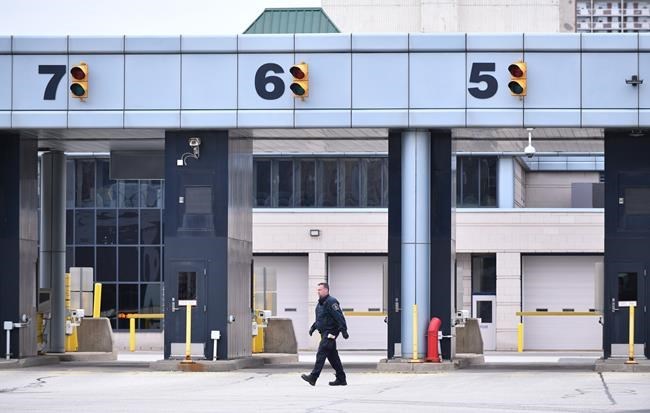OTTAWA — Canada's border agency has an "urgent need" to hire a global technology firm to help develop a biometric strategy in response to rapidly evolving issues including COVID-19.
The Canada Border Services Agency issued a notice of procurement Monday inviting 15 firms to submit proposals for immediately setting up an Office of Biometrics and Identity Management.
The agency also wants a strategy and road map for digital solutions using biometric-related technologies to address issues flowing from the pandemic and other priorities.
Biometric information — a unique identifier such as an iris scan or a fingerprint record — is considered useful in managing the passage of people across borders, though it also poses privacy risks.
The chosen contractor would help the border agency develop a plan to "manage, evolve and adapt" the use of biometrics while considering its relationship with other federal departments and international partners.
In response to questions, the border agency said the new office will act as a centre of expertise and focal point within the agency to provide guidance and advice on the appropriate use of biometrics.
The agency added that privacy considerations are at the forefront of its biometric verification methods and it thoroughly analyzes the technologies before they are implemented.
"The CBSA is establishing sufficient privacy and technical safeguards to help ensure that biometric technologies deployed at the border do not disproportionately or adversely impact specific groups of travellers."
In its latest annual planning document, the agency said it would explore measures to standardize the collection of biometric information on potentially inadmissible travellers to strengthen controls.
It also plans to look at options for greater use of technology that relies on voice recognition and geolocation to confirm the identity and location of people required to report to the agency.
In the United States, the Office of Biometric Identity Management helps match, store, share, and analyze records as part of the biometric services it provides to the Department of Homeland Security and its partners.
It is encouraging to see Canada's border agency is establishing a proactive and systematic approach to the adoption of more biometrics at the border in the form of a new office, said Tamir Israel of the Canadian Internet Policy and Public Interest Clinic, based at the University of Ottawa's law faculty.
"But I am deeply concerned at the substantial increase in biometric use that this procurement document implies. Biometric recognition and identity can be highly intrusive, and we have seen significant pressure to adopt facial recognition technologies in particular at border crossings," he said.
"The experience from other jurisdictions has been that, once in place, reliance on these technologies tends to expand rapidly beyond its initial objectives and frequently facial recognition technologies are repurposed for use beyond the border."
Vito Pilieci, a spokesman for the federal privacy commissioner, said the watchdog had not been consulted about the border services agency's procurement notice, but "we will reach out to the CBSA for more information about the initiative."
"Given the sensitivity of biometrics we regularly recommend that institutions ensure that each initiative using biometrics be evaluated for necessity, effectiveness and proportionality as well as other key principles such as ensuring adequate safeguards, limiting retention and use," Pilieci added.
Generally speaking, biometrics are unlike other types of personal information in that they are intimately associated with the human body and cannot be easily changed, he said. "This makes biometrics particularly sensitive, given their permanence and uniqueness in relation to identity."
Canada's privacy commissioners recently said respect for laws and principles governing personal information must guide introduction of digital or paper proof-of-vaccination certificates that could smooth the transition to post-pandemic life.
The border agency said creation of the new office is not related to potential work on "vaccine passports," adding that all health-related decisions fall to Health Canada and the Public Health Agency of Canada.
The agency also said it would engage the privacy commissioner's office during the development of, and before implementing, any new uses of biometric verification.
This report by The Canadian Press was first published June 7, 2021.
Jim Bronskill, The Canadian Press



